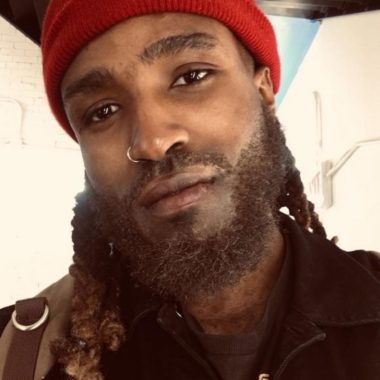Nightlife and New York City are almost synonymous. People from all over the world come to America’s most populous city to jump start their dreams or establish careers —- Jacq (Jacques) Frances was no different. Known as Jacq the Stripper, Jacq traveled to New York City, transformed into a nightlife guru and stripper, then worked with Jeniffer Lopez and Keke Palmer in Hustlers. Today, she’s a touring comedian and author. While speaking to Jacq, I learned about her days as an NYC stripper and her experience with Jennifer Lopez. Learn more about the interesting life of Jacq the Stripper below:
Roderick Thomas: Hi Jacq! Pleasure to speak with you.
Jacq: Thank you, glad to be here.
RT: How are you?
Jacq: I’m good thanks for asking.
RT: Where are you from originally?
Jacq: I grew up in Ontario outside Toronto, Canada.
RT: How’d you find your way to NYC?
Jacq: Well, I’d been stripping for a year in Australia, and I was told that NYC is where you have to be, and America is the place to be a stripper. So I came to NYC.
RT: When did you arrive in NYC?
Jacq: I settled in NYC in 2010, and was there for ten years.
RT: Who was Jacq the stripper in 2010?
Jacq: I was so into money, getting money, investing money, seeing what my money could do. I was also into show business. I’ve always loved making my own money. I guess I was chasing the American dream.
RT: What was life like as a stripper?
Jacq: Stripping for me was about money and freedom. When I got to NYC that changed and it became more about money. All the girls had to look a certain way—-Victoria’s Secret models. So, I changed my look to get what I wanted.
RT: The dinero
Jacq: The money, correct.
RT: Any stories about your stripping days you may want to share?
Jacq: So many. One thing was that you were never supposed to refuse a drink. It was sort of a rule. I would sip on a drink the whole night.
RT: Interesting. Stripping has become more mainstream, but there is still a stigma around strip clubs.Thoughts?
Jacq: Its how we view sex and women, its misogyny. This society asks you to be this hot thing all the time. There are real resources tied to sex, priveleges tied to beauty, and those who can make themselves a commodity from sex and beauty.
Jacq: You want this body? Pay me.
RT: You made a name for yourself in night life, were you trying to become famous?
Jacq: Honestly, no. I didn’t want to be known, I was after money, but opportunities just kept coming.
RT: Ok, so you’re no longer in the stripclub world, what made you leave?
Jacq: I was sort of forced out to the world of stripping. Also, New York allowed me to be an artist in a different way. I realized I hated the drinking, the loud noises and all the finance guys at the club.
RT: What was next after the club scene?
Jacq: I had already begun doing comedy, and I knew I wanted to make just as much money as I did stripping.
RT: What’s the biggest lesson you’ve learned from the strip club?
Jacq: That the whole world is a strip club [laughs]. Everything I’ve learned in the club I’ve applied elsewhere, and now I’m an author and comedian.
RT: In your new book and comedy tour, Divorced in Paradise, you elaborate on your life in NYC and your divorce, how have they affected your comedy and personal life?
Jacq: As far as my show goes, I’m having fun roasting behaviors but not anyone’s spirit, mine included. The show is how I’m processing life and grief and what to do when the show is over.
Jacq: The book contains a ton of my visual art in chronological order. Art saved me many times—it’s a peek into my life.
RT: You’ve also discussed the concept of toxic femininity. How did toxic femininity show up in your life?
Jacq: People pleasing. Toxic femininity showed up in my life through wanting to please everyone, and doing what I could to prevent others from exploding or being upset. Now, I know I have to be true to my own needs.
RT: Well said. And being yourself got you a small role in the 2019 hit film Hustlers, alongside Jennifer Lopez and Keke Palmer. How did that come about?
Jacq: Hustlers was the coolest opportunity that I’ve received to date! I got an email and it changed my whole life. I knew there was a small role and I went for it and got it.
Jacq: I also became a consultant on the movie as well. I coached the girls, and helped them be more authentic. I felt like my opinions were valued on set.
RT: Teaching Jenniffer Lopez some moves, that’s a moment!
Jacq: I know! This movie was about these bad ass women doing bad things. I was like I belong here. I’m very grateful for the experience, now I’m making my own films.
RT: Really?
Jacq: Yes, I made a short film called Tuesday’s with Brian. It’s about a guy who goes to the strip club and does everything wrong.
RT: So what most men probably do in the strip club [laughs].
RT: Jacq, you really are living life your way and making it an adventure. Congrats on your book and comedy tour.
Jacq: Thank you.
RT: How can people follow you and keep up with you?
Jacq: They can follow me on social media at @jacqthestripper.
RT: Awesome! Jacq, thank you for sharing your stories, it’s been a pleasure.
Jacq: You’re welcome, thank you.
RT: Stay up to date on Jacq the Stripper, her book and comedy tour by following @jacqthestripper.









